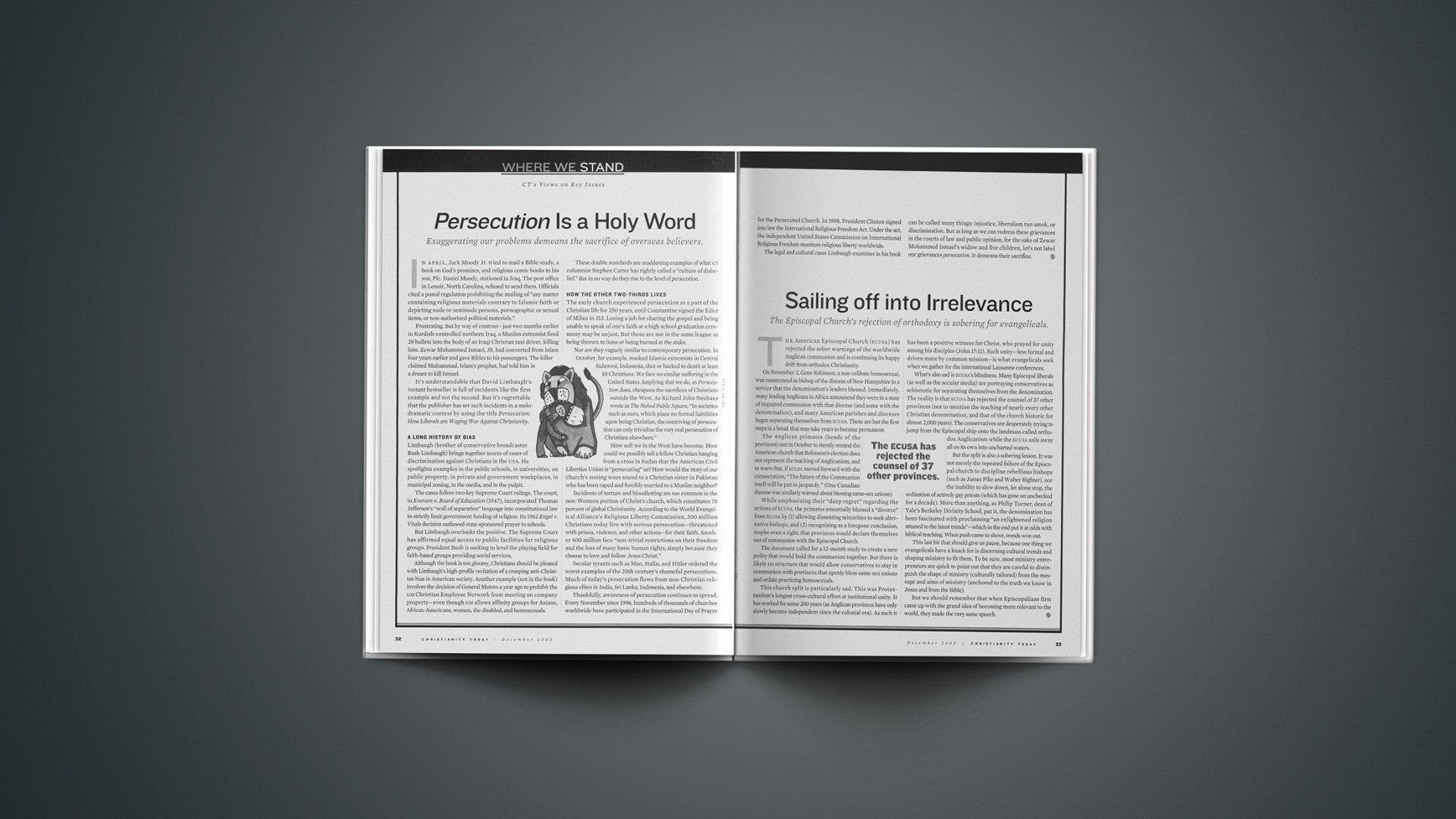IN APRIL, Jack Moody Jr. tried to mail a Bible study, a book on God’s promises, and religious comic books to his son, Pfc. Daniel Moody, stationed in Iraq. The post office in Lenoir, North Carolina, refused to send them. Officials cited a postal regulation prohibiting the mailing of “any matter containing religious materials contrary to Islamic faith or depicting nude or seminude persons, pornographic or sexual items, or non-authorized political materials.”
Frustrating. But by way of contrast—just two months earlier in Kurdish-controlled northern Iraq, a Muslim extremist fired 28 bullets into the body of an Iraqi Christian taxi driver, killing him. Zewar Mohammed Ismael, 38, had converted from Islam four years earlier and gave Bibles to his passengers. The killer claimed Muhammad, Islam’s prophet, had told him in a dream to kill Ismael.
It’s understandable that David Limbaugh’s instant bestseller is full of incidents like the first example and not the second. But it’s regrettable that the publisher has set such incidents in a melodramatic context by using the title Persecution: How Liberals are Waging War Against Christianity.
A Long History of Bias
Limbaugh (brother of conservative broadcaster Rush Limbaugh) brings together scores of cases of discrimination against Christians in the USA. He spotlights examples in the public schools, in universities, on public property, in private and government workplaces, in municipal zoning, in the media, and in the pulpit.
The cases follow two key Supreme Court rulings. The court, in Everson v. Board of Education (1947), incorporated Thomas Jefferson’s “wall of separation” language into constitutional law to strictly limit government funding of religion. Its 1962 Engel v. Vitale decision outlawed state-sponsored prayer in schools.
But Limbaugh overlooks the positive. The Supreme Court has affirmed equal access to public facilities for religious groups. President Bush is seeking to level the playing field for faith-based groups providing social services.
Although the book is too gloomy, Christians should be pleased with Limbaugh’s high-profile recitation of a creeping anti-Christian bias in American society. Another example (not in the book) involves the decision of General Motors a year ago to prohibit the GM Christian Employee Network from meeting on company property—even though GM allows affinity groups for Asians, African-Americans, women, the disabled, and homosexuals.
These double standards are maddening examples of what CT columnist Stephen Carter has rightly called a “culture of disbelief.” But in no way do they rise to the level of persecution.
How the Other Two-Thirds Lives
The early church experienced persecution as a part of the Christian life for 250 years, until Constantine signed the Edict of Milan in 313. Losing a job for sharing the gospel and being unable to speak of one’s faith at a high school graduation ceremony may be unjust. But these are not in the same league as being thrown to lions or being burned at the stake.
Nor are they vaguely similar to contemporary persecution. In October, for example, masked Islamic extremists in Central Sulawesi, Indonesia, shot or hacked to death at least 10 Christians. We face no similar suffering in the United States. Implying that we do, as Persecution does, cheapens the sacrifices of Christians outside the West. As Richard John Neuhaus wrote in The Naked Public Square, “In societies such as ours, which place no formal liabilities upon being Christian, the contriving of persecution can only trivialize the very real persecution of Christians elsewhere.”
How soft we in the West have become. How could we possibly tell a fellow Christian hanging from a cross in Sudan that the American Civil Liberties Union is “persecuting” us? How would the story of our church’s zoning woes sound to a Christian sister in Pakistan who has been raped and forcibly married to a Muslim neighbor?
Incidents of torture and bloodletting are too common in the non-Western portion of Christ’s church, which constitutes 70 percent of global Christianity. According to the World Evangelical Alliance’s Religious Liberty Commission, 200 million Christians today live with serious persecution—threatened with prison, violence, and other actions—for their faith. Another 400 million face “non-trivial restrictions on their freedom and the loss of many basic human rights, simply because they choose to love and follow Jesus Christ.”
Secular tyrants such as Mao, Stalin, and Hitler ordered the worst examples of the 20th century’s shameful persecutions. Much of today’s persecution flows from non-Christian religious elites in India, Sri Lanka, Indonesia, and elsewhere.
Thankfully, awareness of persecution continues to spread. Every November since 1996, hundreds of thousands of churches worldwide have participated in the International Day of Prayer for the Persecuted Church. In 1998, President Clinton signed into law the International Religious Freedom Act. Under the act, the independent United States Commission on International Religious Freedom monitors religious liberty worldwide.
The legal and cultural cases Limbaugh examines in his book can be called many things: injustice, liberalism run amok, or discrimination. But as long as we can redress these grievances in the courts of law and public opinion, for the sake of Zewar Mohammed Ismael’s widow and five children, let’s not label our grievances persecution. It demeans their sacrifice.
Copyright © 2003 Christianity Today. Click for reprint information.
Related Elsewhere
Persecution is available from Amazon.com and other book retailers.
The publisher offers more information about the book.
CTI’s corporate website has a special page for the International Day of Prayer for the Persecuted Church, including a chat room for prayer. The official website for the IDOP is here.
CT‘s persecution page is a compilation of stories from all over the world.
The website of the United States Commission on International Religious Freedom has more information on religious persecution.










